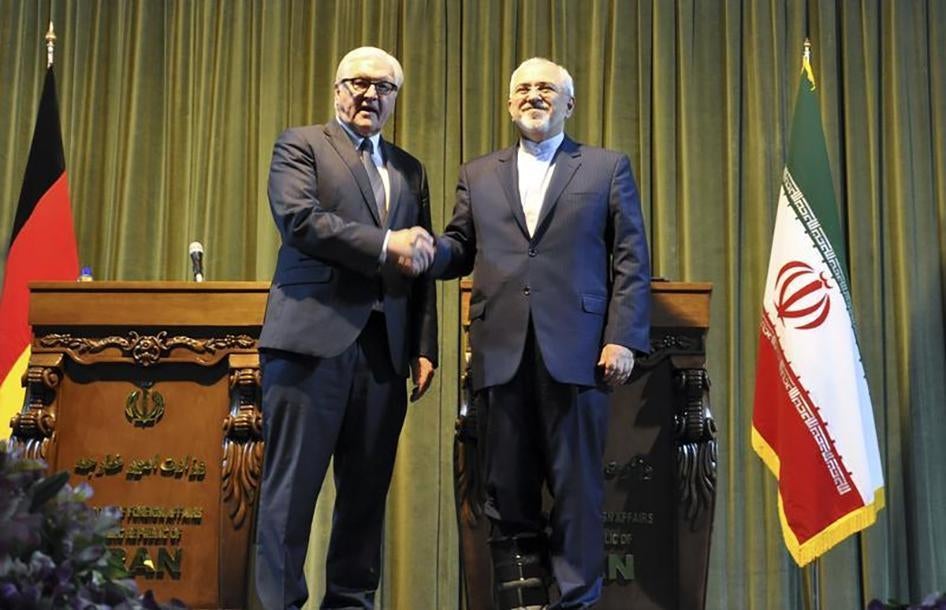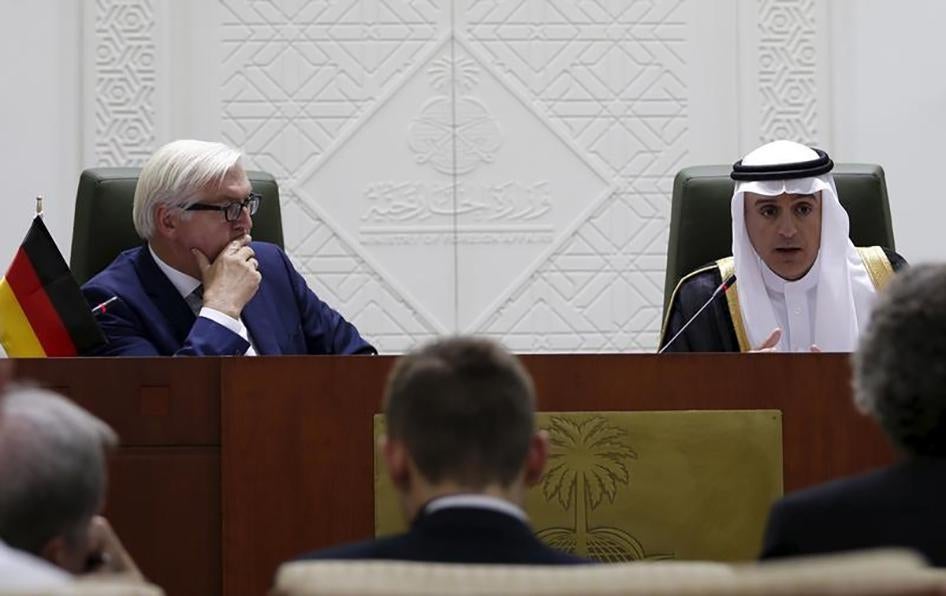When Foreign Minister Frank-Walter Steinmeier visited Iran and Saudi Arabia recently to shake hands with government officials, he didn’t mention publicly one of the most urgent problems in both countries: The deteriorating human rights situation.
Saudi Arabia’s King Salman largely has failed to improve his country’s human rights record during his first nine months. A Saudi-led coalition, with support from the United States, is conducting a bombing campaign and blockade in Yemen, with many apparent violations of the laws of war. These include indiscriminate attacks on civilians, some amounting to war crimes, and the use of internationally banned cluster munitions, which have killed large numbers of civilians.
Under Salman, Saudi Arabia has executed people in record numbers, including nonviolent drug offenders, and repressed reform activists and peaceful dissidents like Waleed Abu al-Khair, serving a 15-year prison term for his human rights work. In another case, Ali al-Nimr was sentenced to public beheading, in part for participating in and inciting protests before he turned 18. Authorities have also failed to take steps to protect the rights of foreign workers and maintained the country’s systematic discrimination against women and religious minorities.
Imagine how shocking and horrifying it would be if every Saudi beheading were posted on YouTube? Germany, and others in the anti-ISIS coalition, should think long and hard about the example their ally is setting.
We are waiting in vain for Steinmeier to publicly condemn such severe human rights abuses, loud and clear. His excuse is that he wants to find partners and help to defuse the conflicts in the region. The war in Syria and the fight against armed groups such as ISIS and Al Qaeda are certainly legitimate reasons for diplomatic meetings. But that shouldn’t mean that Germany should look the other way when people’s rights are abused.
Saudi Arabia’s unlawful attacks and blockade have had a severe impact on Yemen’s civilians. According to the UN, 21 million Yemenis – a staggering 80 percent – need assistance and half the population faces food insecurity. More than 15.2 million people lack access to basic health care, and over 20 million lack access to safe water. With Yemen depending on commercial imports for 90 percent of its food and fuel supplies, the coalition-imposed blockade may amount to starvation of civilians as a method of warfare, a war crime.
Steinmeier and his Saudi interlocutors should have discussed the Saudi-led bombing campaign and publicly agreed to end indiscriminate attacks, including the use of cluster munitions. Steinmeier’s visit to Riyad should have been about more than strategic partnership over Iran and the fight against terrorism.
The Foreign Ministry claims that it is regularly raising human rights issues, like the case of Raif Badawi, the imprisoned liberal blogger. But such discussions are worthless if held behind closed doors because then there is no commitment for change, there are no benchmarks.
The German rhetoric about strategic partnership while protecting human rights is always undermined when it partners with countries like Saudi Arabia that refuse to implement the same ideals at home. If Steinmeier is truly committed to a holistic approach to countering violent extremism, he should press the Saudis to stop muzzling writers, bloggers, and activists. And not raising the harm to civilians in Yemen by the Saudi-led campaign, and Saudi repression at home, was a huge missed opportunity.
Before his trip to Riyad, Steinmeier had been to Tehran. Sadly, he also missed an opportunity there to push for long-overdue human rights reforms.
The nuclear case file has long overshadowed Iran’s dire human rights situation. Serious rights abuses, mostly by judicial, security, and intelligence officials who are rarely held to account for their actions, affect thousands of Iranians on a daily basis.
The nuclear deal comes at a time when Iran’s judiciary is overseeing the execution of hundreds of prisoners, many for nonviolent drug crimes. Officials have hanged more than 650 people this year alone, including several who allegedly committed crimes as children.
The security authorities routinely harass and prosecute prominent lawyers and human rights activists.
Iran is one of the world's largest prisons for journalists. Activists and writers on Social media have also been particularly hard hit, with revolutionary courts handing down harsh sentences, including death, for Facebook posts. The opposition figures Mir Hossein Mousavi, Mehdi Karroubi, and Zahra Rahnavard have been under house arrest since 2011. And Tehran refuses to cooperate with United Nations rights bodies, including barring entry to Ahmed Shaheed, the UN expert on human rights in Iran.
Many Iranians hope that resolving the nuclear standoff will lead to the lifting of tough economic and financial sanctions, and an improvement in their lives. Yet, for thousands of prisoners on death row, hundreds of political prisoners facing torture or wasting away in detention facilities, and members of religious minorities unjustly denied access to education and employment, any hope of a brighter future remains remote.
As other countries position themselves to take advantage of the lifting of sanctions against Tehran, they should remember that increasing economic, financial, and diplomatic integration with Iran will give them greater leverage not only to make lucrative business deals but to speak out strongly against rights abuses. It is imperative for them to take advantage of this leverage and push Tehran to abide by its human rights obligations. Iran’s people deserve no less.
But Steinmeier hasn’t done any of that.
His focus has been solely to bringing the two powerful arch-enemies -- Iran and Saudi Arabia -- to one table in the near future. This is a legitimate and necessary step for peace in the region. Steinmeier was right to ask Tehran to convince Syria’s President Bashar al-Assad to stop his horrendous attacks against civilians with barrel bombs. But that is far from enough.
Believing that one can achieve lasting peace and stability by ignoring the dire human rights situation in both countries is naïve and has nothing to do with proper realpolitik. The unacceptable human rights situation in Iran and Saudi Arabia is the most important factor in the region’s instability. Only a principled human rights policy can lead to sustainable peace.
Hasn’t the Arab spring and its collapse shown the world in all clarity what happens if a misconceived stability policy leads to flattering oppressive regimes. The result sooner or later is always chaos and violence. There is no way to choose between stability and peace talks or human rights and justice. Without the respect for human rights, there is no stability.










